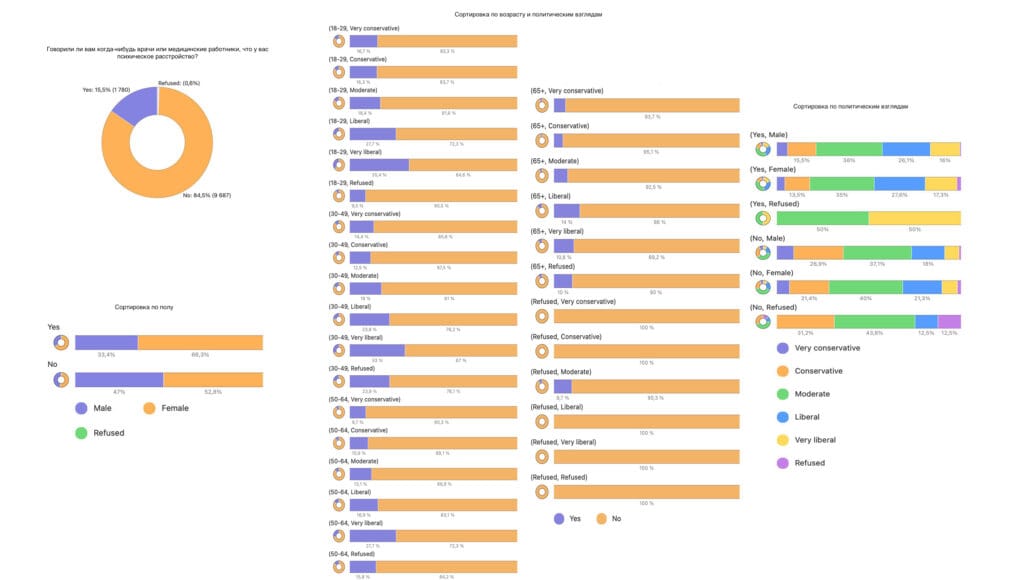The news spread widely on the Internet: scientists allegedly found that liberal youth are more susceptible to mental disorders than other groups of the population. We decided to check if this is true.
Back in 2023, a tweet about this research was published by the project SVTV News, and at the end of March 2024, the publication “Mriya" Similar messages can be found on social networks (for example, in “VKontakte") and on blogging platforms ("Peekaboo", LiveJournal, "Zen"). Some publications clarify that we are talking primarily about girls with liberal views - many posts accompanied by photographs of activists holding feminist posters. Popular Telegram channels also wrote about this: “Pozdnyakov 3.0"(420,000 views at the time of writing this analysis), "Sledgehammer 18+"(71,000), "Evil Gorynych: how to lose a country"(66,000), Nina Vatt (50,000), "Boiling water"(44,000), etc.
Although in 2024 some Russian-language sources presented a study on the prevalence of mental illness among different population groups as fresh, these data are by no means new. In the English-speaking segment of the Internet, similar statistics were published earlier - for example, The Washington Free Beacon wrote about the study back in 2021. The authors of this American conservative publication, in turn, referred to thread on Twitter (now X), written by Zach Goldberg, a scholar at the Manhattan Institute for Policy Studies (USA). He analyzed the results survey, conducted in March 2020 by the American non-profit organization Pew Research Center and dedicated to how restrictions introduced shortly before due to the COVID-19 pandemic affected the lives of Americans. A total of 11,537 people took part in this study. It is important to note that this is not a random sample, as is often the case in such surveys: all respondents are included in American Trends Group — a base of more than 10,000 people who have been recruited by the Pew Research Center over many years and regularly participate in research.
As is always the case when conducting sociological surveys, the organizers recorded some characteristics of the respondents, such as gender, age, marital status and level of education. They were also asked to describe their own political views as extremely liberal, liberal, moderate, conservative or extremely conservative. Study participants were also asked whether they had ever been told by doctors or other health care providers that they had a mental disorder. Note that obtaining all this data was not the purpose of the survey - the researchers used information about their regular respondents and combined them with answers about anti-Covid measures.

When asked about mental illness, 15.5% of respondents answered positively: 66% of them were women, 33% were men. Among these women, 35% said they were moderate, 45% liberal or extremely liberal, and 18% conservative or extremely conservative. Among men, the numbers looked similar: 36%, 42% and 21%, respectively. Let us remember that we are talking about the shares of 15.5% of respondents who answered the question in the affirmative. In terms of age, people with liberal and extremely liberal views aged 18 to 29 were more likely than other groups to admit that they had ever been told about mental disorders. Thus, in terms of recounting statistics, Goldberg appears to have interpreted the study correctly.
However, in many publications about this Pew Research Center survey, there is a substitution of concepts: the data does not show the percentage of respondents currently suffering from mental disorders, but the proportion of those who admitted to having ever been diagnosed with a mental disorder. That is, there is a high probability that among those who answered negatively, there are people who simply did not consult a doctor for advice on this issue or did not dare to tell the researchers about it. Mental disorders, unlike most other diseases, are quite stigmatized. Many are afraid that others will treat them worse if they find out about such a health problem, or they themselves are ashamed of their alleged diagnosis, so they do not turn to specialists, even if there are reasons for this. Political scientists note, that among conservatives this phenomenon is more pronounced. In recent years, the psychiatric community has been actively fighting the stigma associated with mental disorders, including publishing numerous materials on this topic on the Internet. It is logical that young people who actively use the Internet are more willing to turn to doctors if they are worried about psychological problems, and are less likely to be afraid to tell strangers about it. By the way, the authors of most of the publications mentioned at the beginning of this analysis also stigmatize mental illness, and speak negatively about supporters of liberal views (this can be seen from the rhetoric and selected illustrations).
Since the survey in question was not focused on the relationship between political views and the presence of mental disorders, its authors did not pay much attention to this topic. Therefore, it is difficult to understand from the study how much of its results reflect real differences in mental health, and how much is caused by stigma or simply differences in the basic demographic characteristics of respondents (for example, income level or place of residence, and as a result, access to health care). Goldberg in one of the tweets analyzing the study admits: The results may be this way precisely because liberals are simply more likely to seek medical help in general.

In addition, respondents' responses may have been influenced by their personal perceptions of what is considered a mental disorder. Thus, according to the fifth edition of the Diagnostic and Statistical Manual of Mental Disorders (DSM-5), used in American psychiatry, such diseases include stuttering. This is not entirely obvious to people far from medicine, so drawing conclusions only on the basis of respondents’ self-assessment is unfounded.
Liberals like found out Columbia University researchers generally tend to spend more time thinking about stress-inducing topics, such as racial injustice, income inequality or climate change. At the same time, surveys show that conservatives are on average more satisfied with their lives and are more likely to report psychological well-being. However, scientists from the University of California, who analyzed data from online surveys, statements by politicians and publications by social network users, claimthat this may be misleading. Compared to people with conservative views, liberals were more likely to use positive emotional language in their speech, and also smiled more often and more sincerely in photographs.
Thus, the statement that has spread across the media and social networks that young liberals are more likely than other groups of the population to suffer from mental disorders is based on a study whose authors did not study the relationship between mental health and a person’s political views and, accordingly, did not draw any conclusions about it. Moreover, the presence of such diseases in respondents was determined solely by the answer to the question “Have health care providers ever told you that you suffer from mental disorders?” These answers could be distorted for many reasons: from embarrassment to admit having mental health problems to a simple lack of knowledge about what is considered such a problem. And to say that someone does not have a mental disorder just because the person has not previously been diagnosed with it is incorrect. On the other hand, since the question was not about the current moment in time, but about the entire life of the respondents, there is a possibility that some of those who answered this question positively have long since cured their disorder.
Cover photo: Stefan Müller (climate stuff, 2 Mio views) from Germany, CC BY 2.0, via Wikimedia Commons
Read on the topic:
- Pew Research Center. Most Americans Say Coronavirus Outbreak Has Impacted Their Lives
- Is it true that mental illnesses most often experience exacerbations in spring and autumn?
- Is it true that for decades a French official lived with only 10% of his brain?
If you find a spelling or grammatical error, please let us know by highlighting the error text and clicking Ctrl+Enter.






